Waste materials are a major environmental problem, which is a threat to the environment. It is important to reuse these materials and dispose of them. Waste can be used in the construction industry in two ways: by reusing and recycling. Nowadays, an increasing number of important buildings are constructed with an emphasis on the effective use of waste materials. In regard to this ongoing emphasis, researchers from Flinders University’s Chalker Research Lab have developed a more sustainable alternative to making bricks by using waste materials.
The research team used low-cost feedstocks to make lightweight but durable polymer building blocks, which can be bonded together with an adhesive-free chemical reaction. Their study tested the strength of these materials and explored ways they can be reinforced in construction.
The new type of brick is made from waste cooking oil mixed with sulphur and dicyclopentadiene – both byproducts of petroleum refining. They can be bound together without mortar, and the bricks were found to be strong, durable, and suitable for a range of applications.
“In this study, we tested a new type of brick we can make from waste cooking oil, mixed with sulfur and dicyclopentadiene (DCPD),” says Justin Chalker, Professor of Chemistry at Flinders and the project leader. He further explained that the bricks bond together without mortar upon application of a trace amount of amine catalyst. All the starting materials are plentiful and can be classified as industrial waste.
“The bonding in this novel catalytic process is very strong, producing a sustainable construction material with its own mortar which will potentially streamline construction,” adds Chalker Lab research associate Dr. Maximilian Mann.
The latest study expanded the research to test the new bricks’ mechanical properties and look at ways to reinforce them in construction, including carbon fibre fillers.
Chalker Lab research associate Dr Maximilian Mann says as well as repurposing waste materials into value-added construction materials, the polymer bricks’ sulfur-sulfur bond means they can be bound together without mortar like traditional building methods.
The research team is collaborating with Clean Earth Technologies for further development, scale-up, and possible commercialization. According to the research paper’s author, Paris Pauling: “The research is an excellent example of new scientific developments in sustainable materials science.”





